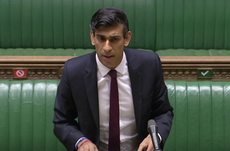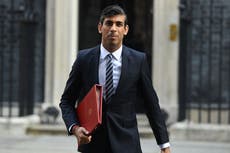Rishi Sunak’s Winter Economic Plan: What he said – and what he really meant
Our chief political commentator guesses what was going through the chancellor’s mind as he delivered his statement

Your support helps us to tell the story
From reproductive rights to climate change to Big Tech, The Independent is on the ground when the story is developing. Whether it's investigating the financials of Elon Musk's pro-Trump PAC or producing our latest documentary, 'The A Word', which shines a light on the American women fighting for reproductive rights, we know how important it is to parse out the facts from the messaging.
At such a critical moment in US history, we need reporters on the ground. Your donation allows us to keep sending journalists to speak to both sides of the story.
The Independent is trusted by Americans across the entire political spectrum. And unlike many other quality news outlets, we choose not to lock Americans out of our reporting and analysis with paywalls. We believe quality journalism should be available to everyone, paid for by those who can afford it.
Your support makes all the difference.What Rishi Sunak said: We are in a fundamentally different position than we were in March. We now know much more about the coronavirus. Public awareness of the risks and how to mitigate them is far greater.
What he really meant: The worst is over, but wait with the bunting and the street parties.
What he said: It is now clear, as the prime minister and our scientific advisers have said, that for at least the next six months, the virus and restrictions are going to be a fact of our lives.
What he meant: I wanted to get the economy back to normal and take the risk of a second wave of the virus, but I was overruled.
What he said: Our economy is now likely to undergo a more permanent adjustment; the sources of our economic growth and the kinds of jobs we create will adapt and evolve to the new normal.
What he meant: This is a bit of a problem for a politician whose fortunes rest on his ability to deliver economic growth.
What he said: As the economy reopens, it is fundamentally wrong to hold people in jobs that only exist inside the furlough.
What he meant: Even the Labour Party agree with this (most of the time), so I am fairly safe in delivering a blunt truth.
What he said: I cannot save every business. I cannot save every job. No chancellor could.
What he meant: I am a Conservative. I am also making a virtue of necessity by trying to be attractively honest. But even if the other lot were in charge they wouldn’t be able to work miracles.
What he said: In March, the problem was that we ordered businesses to close. In response, we paid people to stay at home and not work. Today, the problem is different. Many businesses are operating safely and viably, but they now face uncertainty and reduced demand over the winter months.
What he meant: Here are the creative and imaginative schemes that the prime minister promised I would deliver after I told him I wasn’t ready.
What he said: These are radical interventions in the UK labour market; policies we have never tried in this country before.
What he meant: My officials stayed up all night putting this stuff together. I have no idea if it will work.
What he said: Today's measures mark an important evolution in our approach. Our lives can no longer be put on hold.
What he meant: Government policy has changed again. I summarise: Don’t go to work; go to work; don’t go to work.
What he said: Since May we have taken steps to liberate our economy and society. We did these things because life means more than simply existing. We find meaning and hope through our friends and family, through our work, through our community.
What he meant: I am not just worried about GDP. I am a philosopher prince, and an ambitious politician who hopes one day to lead this country, so I realise I need to offer some uplift.
What he said: People were not wrong for wanting that meaning, for striving towards normality, and nor was the government wrong to want this for them.
What he meant: We are all torn between fear of the disease and wanting to get on with things. I am on the side of wanting to get on with things.
What he said: The truth is the responsibility for defeating coronavirus cannot be held by government alone. It is a collective responsibility, shared by all, because the cost is paid by all.
What he meant: Do not blame the government if it all goes wrong. It is all your fault.
What he said: We have so often spoken about this virus in terms of lives lost, but the price our country is paying is wider than that. The government has done much to mitigate the effects of these awful trade-offs between health, education and employment. As we think about the next few weeks and months, we need to bear all those costs in mind.
What he meant: We should worry less about Sir Patrick Vallance’s alarmist graph showing an exponential but theoretical rise in the number of cases, and worry more about damage done to people’s prospects and livelihoods.
What he said: It would be dishonest to say there is now some risk-free solution, or that we can mandate behaviour to such an extent we lose any sense of personal responsibility.
What he meant: I have nothing to offer you but risk and responsibility. Life is tough, but at least I’m honest about it.
What he said: What was true at the beginning of this crisis remains true now. It's on all of us, and we must learn to live with it, and live without fear.
What he meant: I am a Conservative. You cannot expect government to do everything for you and keep you totally safe. Chin up. Vote for me.





Join our commenting forum
Join thought-provoking conversations, follow other Independent readers and see their replies
Comments